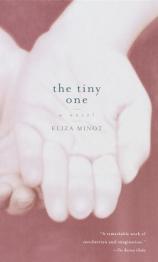Reading Group Guide
Discussion Questions
The Tiny One

1. Given the subject matter, one might assume The Tiny One to be a dark book indeed. Yet Minot's novel teems with joy, and leaves the reader uplifted. How does the author accomplish this effect?
2. Charlotte Brontë once wrote: "Children can feel, but they cannot analyze their feelings." How does The Tiny One support this idea? How does it defy it?
3. Perhaps the most remarkable aspect of The Tiny One is Eliza Minot's uncanny rendering of a childhood. With breathtaking accuracy, she evokes Via's fascination with the human body; her daily experience of profound heartbreak, confusion, and joy; the random surges of energy; her unabashed love for her family. Of Via's many thoughts and feelings, which are the most startling?
4. Why do you suppose the first and one of the last chapters of the book are told in the third person, whereas all of the information in between is told directly from Via's point of view? How does this technique affect the experience of the story?
5. A review of The Tiny One described Minot as having "a sorceress's ability to perceive the emotional spirits trapped in nature"(Christopher Lehmann-Haupt, The New York Times). How does Via's experience of the natural world restore her connection to her mother?
6. Via's family is a large and loving one, from her brothers Cy and Pete to the seven Revere cats. Though The Tiny One focuses on Via's experience, we are privy to other family members' grief, particularly in the beginning and end of the novel. How does Via respond to her father's pain? To her sister Marly's? How does the family respond to Via as she grapples with her mother's death?
7. Via's thoughts lead her to recollect earlier experiences with death (the discovery of Cinder on the train tracks) and with illness (Mr. Emerson's sickness). How do these memories help her to understand the loss of her mother?
8. Perhaps the greatest--and most lasting--gift a parent offers a child is the knowledge that he or she is wonderfully unique. How does Mum make Via feel special? How does the act of remembering these moments keep Mum "alive"?
9. In a conversation with her mother about saints, Via asks whether or not Jesus is a saint. When Mum responds, "He's the son of God," Via presses the point, and is asked by her mother to find out at Sunday school. Why is it important for Via to remember this story?
10. Eliza Minot presents the actual moment that Via learns of her mother's death in chapter eighteen. Why does she choose the end of the novel for this scene?
11. Like all children, Via Revere observes the world in all its less flattering moments. With humor and frightening accuracy, she describes a teacher's bad breath, the static electricity fuzzing a fellow student's hair "like tentacles of a sea animal." How does Minot's depiction of this wonder add to the book's realism? How does it lend the material a life-affirming effect?
12. "Things look farther now," says Via. "I don't feel like myself but at the same time I feel like me. I'm older now." The death of a parent is one of the most transformative events of an individual's life--whether the bereaved is a child or an adult. How cognizant of this fact is Via at the beginning of the novel? At the end?
The Tiny One
- Publication Date: October 17, 2000
- Paperback: 272 pages
- Publisher: Vintage
- ISBN-10: 037570633X
- ISBN-13: 9780375706332







